17 March 2023
Weekly Market View
Canaries in the coalmine?
The two US banks that failed over the past week and the liquidity problems at some other US and European lenders are early symptoms that the central bank rate hikes are starting to bite, especially in the weakest parts of the economy.
As such, we believe we are in the late stage of the economic cycle, which implies we are near, if not at, the peak of interest rates. ECB President Lagarde’s comments this week suggest that central banks are starting to worry about, if not prioritise, financial stability over their fight against inflation.
While the regulatory response so far should reassure bank depositors of the safety of their deposits, the evolving macro backdrop reconfirms our SAFE investment approach, which prefers high grade bonds and, more broadly, a diversified basket focused on income generation to ride out the end of the economic cycle.
What are the investment implications from the recent events on the US and European financial sector?
What is the likely impact on Asian USD bonds from the recently concluded China Congress and recent market events?
Is safe haven demand likely to push the USD higher?
Charts of the week: Rates outlook softens, lifting SAFE assets
The pricing of Fed rate cuts later this year has helped bonds and our defensive asset allocation year-to-date
Market estimates of Fed and ECB rates, today vs 8 March
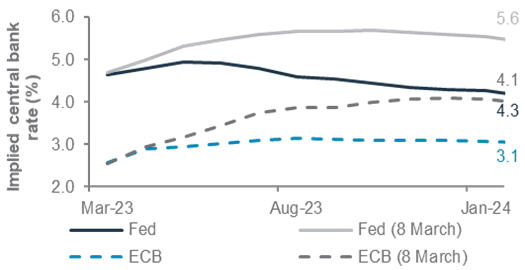
Performance of our four key asset allocation baskets
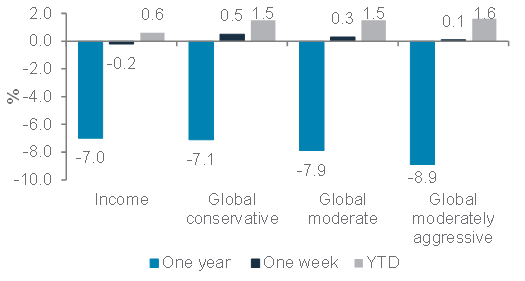
Source: Bloomberg, Standard Chartered
Editorial
Canaries in the coalmine?
History shows something usually breaks when central banks raise rates sharply. This time, we have seen the steepest ECB rate hiking cycle and the second steepest Fed hiking cycle in history. The two US banks that failed over the past week and the liquidity problems at some other US lenders and Credit Suisse are early symptoms that the central bank rate hikes are starting to bite, especially in the weakest parts of the economy. As such, we believe we are in the late stage of the economic cycle, which implies we are near, if not at, the peak of interest rates. ECB President Lagarde’s comments this week suggest that central banks are starting to worry about, if not prioritise, financial stability over their fight against inflation. While the regulatory response so far should reassure bank depositors of the safety of their deposits, the evolving macro backdrop reconfirms our SAFE investment approach, which prefers high grade bonds and, more broadly, a diversified basket focussed on income generation to ride out the end of the economic cycle.
The collapse of Silicon Valley Bank (SVB) and Signature Bank represent two of the three biggest bank failures in US history. While SVB was an outlier among US banks due to its excessive reliance on technology sector start-ups, its sudden collapse is an example of how tight financial conditions first hurt the most vulnerable businesses. After 450bps of Fed rate hikes in the past year, US money supply has started to contract, banks have started to tighten lending conditions and savers are seeking refuge in the most secure banks for their deposits. Consumer spending is likely the next shoe to drop. Credit Suisse’s liquidity crunch is a symptom of the same malaise in Europe, where the ECB has raised rates by 350bps over the past year.
US and Swiss regulators and major US banks have taken decisive steps over the past week to inject liquidity into the troubled lenders and protect bank depositors. Regulators at other major economies are likely to take a leaf out of the same playbook in the event of a liquidity crisis elsewhere. However, like the proverbial canary which first senses trouble in a coalmine (carbon monoxide leaks), we believe these financial stresses signal financial conditions have tightened enough to cause a recession likely sooner than markets are pricing in. While inflation remains elevated in the US and Europe and job markets are tight, these are historically lagging indicators.
Given this, the window for further rate hikes have significantly narrowed, in our view. We now see only a 60% probability of a 25bps Fed rate hike on 22 March, and a 25% chance the Fed pauses. This compares with market expectations of a 50bps Fed rate hike just last week, after Chair Powell’s testimony to the Congress. The ECB, which arguably faces a more difficult inflation backdrop, is likely done with its rate hikes for now after it went through with its planned 50bps rate hike this week.
Investment implications: The above backdrop reinforces our belief in the SAFE investment strategy that we have highlighted since late last year: a) Recent market performance confirm our preference for high grade bonds over all other assets. While Developed Market (DM) government bonds have delivered, DM investment grade and Asia USD corporate bonds have also gained over the past week. We would look to increase maturity in our high grade bond allocations on any bounce in bond yields; b) Within equities, we would continue to rebalance from DM equities to more attractively valued Asia ex-Japan (particularly China) as Asian growth remains resilient, in contrast with looming recessions in the US and Europe; c) Among sectors, the technology sector (where long-term growth drives much of its value and is thus most sensitive to rates) is a proxy for those seeking to benefit from the rates pullback; d) We would sell into any USD rally. JPY’s outperformance this week amid troubles in the West reinforces its defensive qualities; we see scope for further gains if the Dollar index (DXY) fails to decisively break above a key resistance at 104.7; e) Gold, which has also delivered in recent weeks as a volatility hedge, is likely to benefit near-term, especially if USD weakens.
– Rajat Bhattacharya
The weekly macro balance sheet
Our weekly net assessment: On balance, we see the past week’s data and policy as negative for risk assets in the near term.
(+) factor: Fed backstop, China economic bounce
(-) factor: Financial system instability, hot US consumer inflation
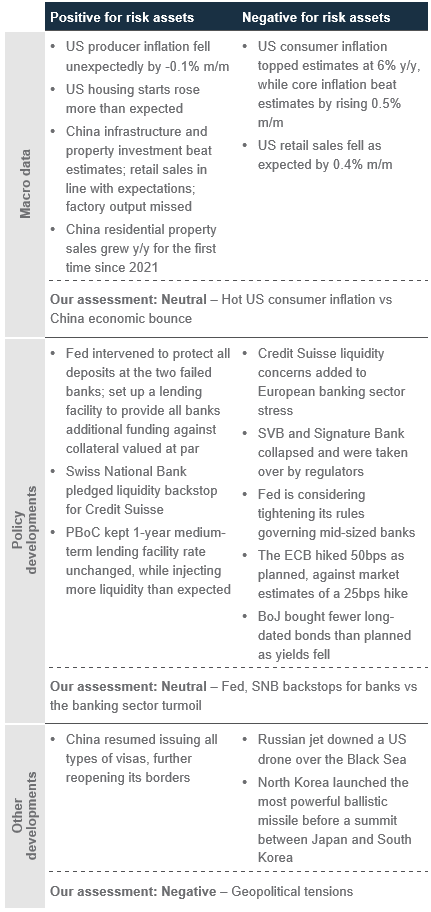
US core inflation remains elevated, but producer prices have started to cool, raising the prospects of softer consumer inflation prints later this year
US core consumer and core producer price inflation
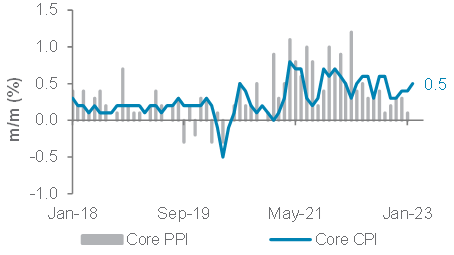
The ECB cut its inflation forecast but raised its growth forecast for 2023
ECB’s new growth and inflation forecasts
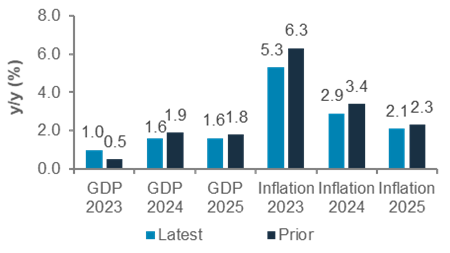
China’s fixed asset investment beat estimates and retail sales met expectations, while factory output missed estimates
China’s retail sales, industrial output and fixed asset investment growth (YTD)
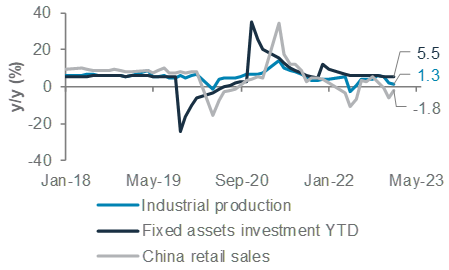
Top client questions
What are the investment implications from the recent events on the US and European financial sector?
The past week saw two US regional bank failures, resulting in the Fed putting in place measures to limit potential contagion. We expect the fallout to the wider financial sector to be limited, though elevated financial stress reinforces our view that a recession is on its way. Within the US banking sector, regulatory costs are likely to rise for the regional and smaller banks (which thus far faced lighter regulation) and competition for deposits could reduce net interest income (NII). We believe large US banks are likely to gain market share from smaller banks and benefit on a relative basis.
Meanwhile, the sharp drop in Credit Suisse stock and bond prices dragged European banks and broader equities lower. We believe this is a good opportunity to review the rationale behind our Overweight view on European financials and what has changed:
- Rising interest rates supporting NII growth: Markets expect rates to rise to 3.1% by end-2022, down from the 3.8% expected just 3 weeks ago. Rising rates should support NII growth, but to a lesser extent, and competition for deposits could erode NII.
- Valuations are cheap: Consensus 12m forward P/E has corrected to 8.1x, at the low end of history and a 35% discount to the broader market. We believe they remain attractive.
- Strong balance sheets to withstand a recession: A crisis of confidence could test the sufficiency of banks’ liquidity buffers and regulatory response. Higher funding costs and less business activity could also necessitate capital raisings.
- Better macro environment in Europe, a mild winter averting an energy crisis and China reopening supporting exports: This could be at risk from financial sector instability.
Overall, we believe these factors warrant caution for now as fundamental conditions remain fluid and market prices can overshoot during volatile periods. The elevated volatility and cheap valuations do, however, create opportunities in structured strategies.
From a bondholder perspective, we see limited impact on the broader market. In the US corporate bond market, regional bank bonds account for a small fraction of the total market (c.2%). This means the rise in regional bank bond credit spreads has had only a marginal impact on the overall market.
We believe the reaction of the subordinated bank debt market has also been largely in line with expectations given the concerns around the European banking sector. Credit spreads have widened across the board, but more so for the most junior (Additional Tier-1 perpetuals) bonds and less so for global High Yield bonds. We continue to like diversified exposure to the subordinated bank debt asset class but would wait for a better entry point.
— Fook Hien Yap, Senior Investment Strategist
— Abhilash Narayan, Senior Investment Strategist
Financial sector equities in the US and Europe have seen a sharp correction recently
Total return from MSCI US Financials and MSCI Europe Financials indices in the past year
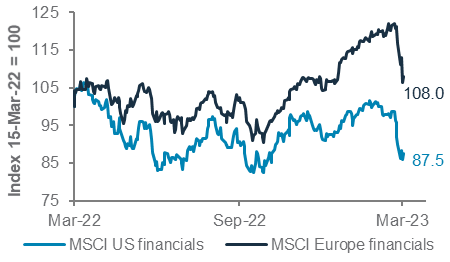
The yield premium on junior bank debt* has risen slightly more than that for DM High Yield bonds
Yield premium on DM High Yield bonds and global bank Contingent Convertible bonds (CoCos)* over US government bonds
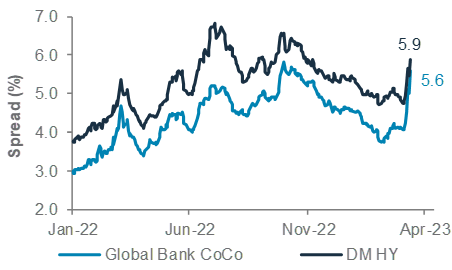
*See explanatory note on page 9
Top client questions (cont’d)
What is the likely impact on Asia USD bonds from the National People’s Congress and recent financial sector stress?
We believe Asia USD bonds – of which c.40% comprises Chinese issuers – should remain supported by policies from the National People’s Congress. First, the expansionary yet conservative GDP growth target of 5% should support corporate earnings. Second, several cross-organisation reforms should help improve supervision efficiencies. Areas of focus include containing future housing market spillover risks, optimizing local government financial health, improving corporate governance and fighting irregularities and personal misbehaviours.
We also believe the fallout on Asia USD bonds from the recent stress in the US and European financial sectors is likely to be minimal. While bond yield premiums (over risk-free rates) have widened somewhat, we expect the direct impact on Asian financial bonds to be minimal given their regional business bias. We would assess the risk of Asian financials facing similar problem in the future as low. Their asset base remains well-diversified, with a tilt towards traditional business segments. Also, many of the largest Asian banks are fully or partly controlled by their respective governments due to strategic importance, which in our view, improves credit resilience.
— Cedric Lam, Senior Investment Strategist
The spillover of financial sector stress to Asian financial bonds has been limited
YTD changes of yield premium for USD-denominated US, Euro Area and Asian financial sector bonds over US government bonds
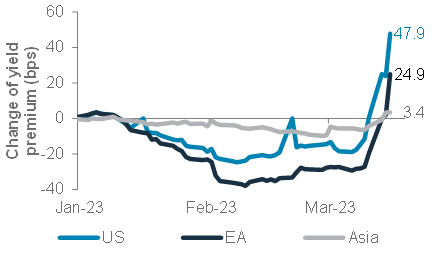
Is safe haven demand likely to push the USD higher?
The USD index (DXY) has had a fairly volatile week. It declined by nearly 1.5% from its 8 March high, following the rapid repricing of Fed rate hike expectations in the aftermath of SVB and Signature Bank closures. Through the week, the USD bounced back on renewed concerns around Credit Suisse and possible implications for the European banking system. While a continued risk-off sentiment could push the USD higher towards 105.7 or 107.10, we would use any rallies to sell it for three main reasons:
- Our base case is that the recent bout of concern in the US and European banking system is unlikely to turn into a full-blown contagion. Hence demand for safe havens is likely to ebb.
- We expect the differential between 2-year US and European government bond yields to narrow.
- China’s re-opening should help boost non-US growth, which would argue for a weaker USD.
For investors looking for a hedge against a risk-off scenario, we would look to consider the JPY. In our assessment, JPY appreciation over the past few days has not fully reflected the decline in US and European bond yields.
— Abhilash Narayan, Senior Investment Strategist
JPY has gained this week from the risk-off sentiment and could benefit further to reflect the narrowing of yield differential with the US since the start of the year
USD/JPY and 2-year yield differential between US
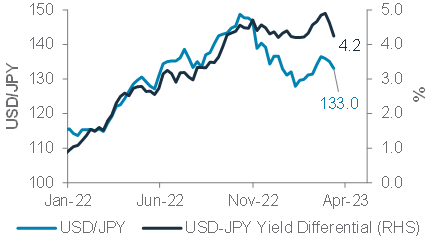
Top client questions (cont’d)
Should we add exposure to gold as a hedge now?
Gold appreciated strongly over the past week amid concerns over a widening banking crisis as investors sought shelter from the sell-off in risk assets. It was also supported by the fall in real (inflation-adjusted) yields and the weaker USD, which are both inversely related to gold.
If history is any guide, gold tends to deliver a positive return whenever there is short-term stress in the financial system. On average, gold delivered a daily return of 1.6% whenever the Forward Rate Agreement-Overnight Index Swap spread, one indicator of potential banking sector stress, jumps 1 standard deviation (SD) above its long-term mean. This is consistent with our view of gold as a portfolio ballast.
On technical charts, gold broke above its 50DMA, signalling a positive turn in short-term momentum. Investor positioning remains far from extremes, suggesting it is unlikely to stand in the way of further gains. These suggest there is a reasonably high probability of gold overshooting towards 1,950 in the very short term, especially if banking sector fears persist. Having said that, we are mindful that gold helps mitigate volatility over relatively short time horizons. Hence, over a longer three-month period, we would not chase recent gains excessively and instead expect gold to settle back at around USD 1,875.
— Zhong Liang Han, CFA, Investment Strategist
Gold tends to deliver a positive return whenever there is short-term stress in the financial system such as the one seen over the past week
XAU/USD
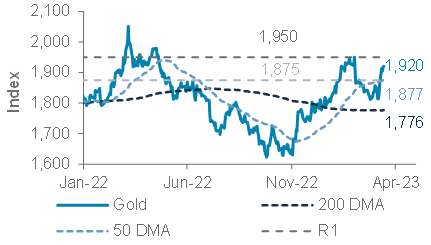
Market performance summary*
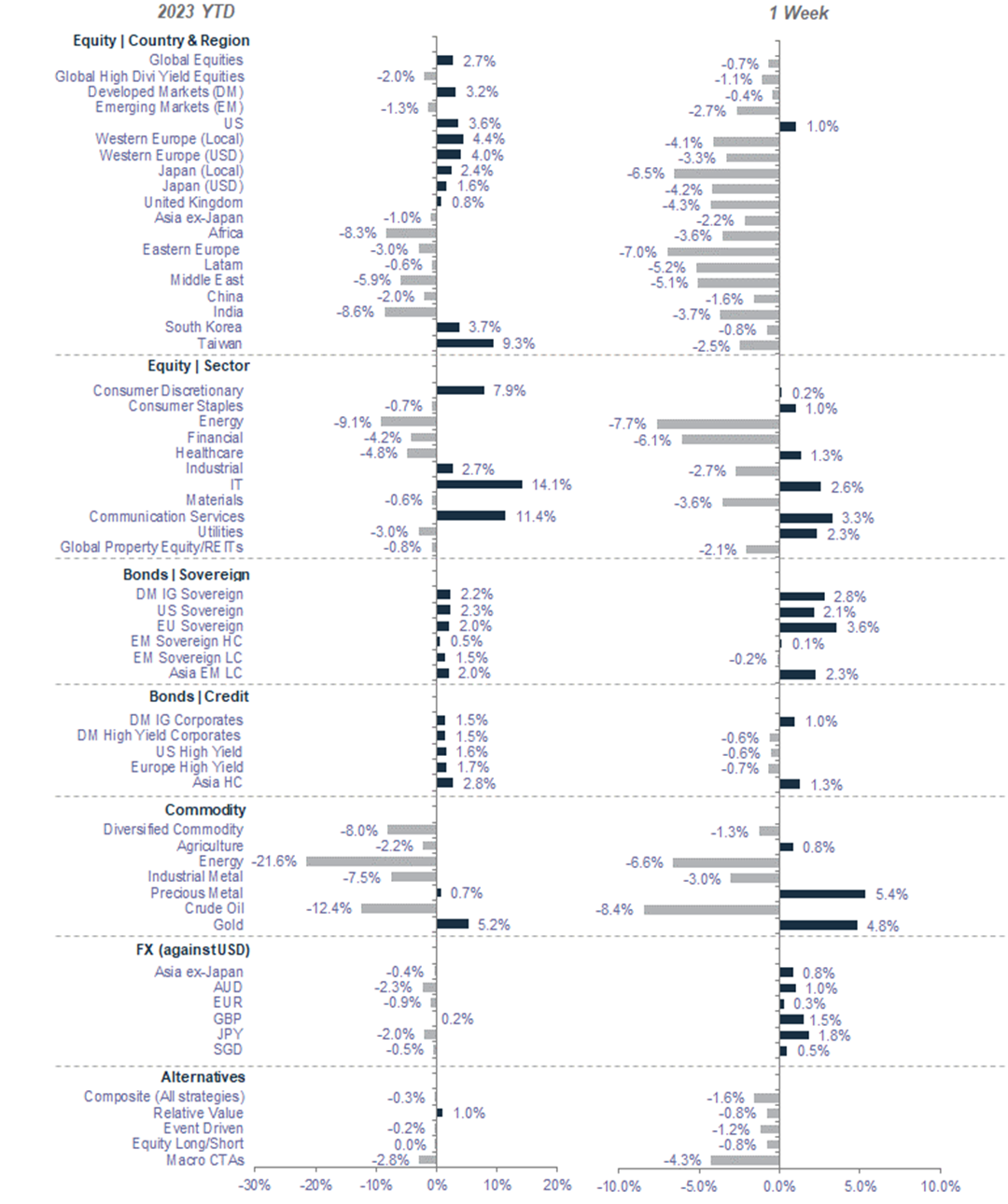
*Performance in USD terms unless otherwise stated, 2023 YTD performance from 31 December 2022 to 16 March 2023; 1-week period: 9 March 2023 to 16 March 2023
Our 12-month asset class views at a glance
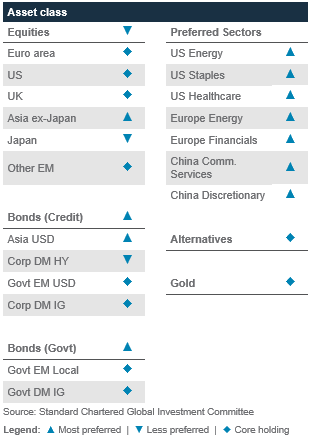
Economic and market calendar
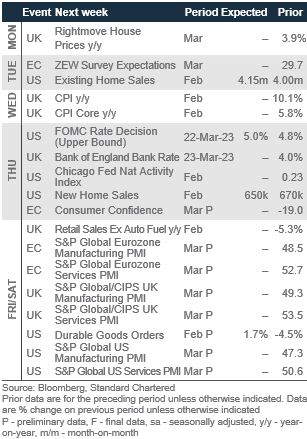
Next support for the US 10-year bond yield is at 3.39%
Technical indicators for key markets as of 16 March close
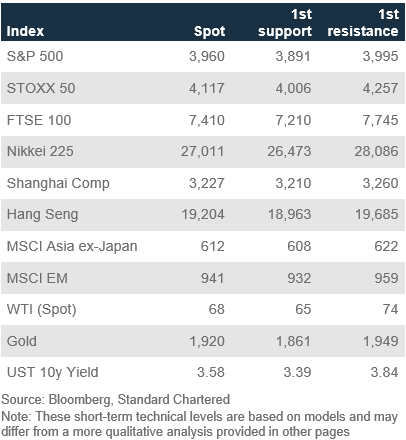
Investor diversity remains healthy across asset classes
Our proprietary market diversity indicators as of 16 March
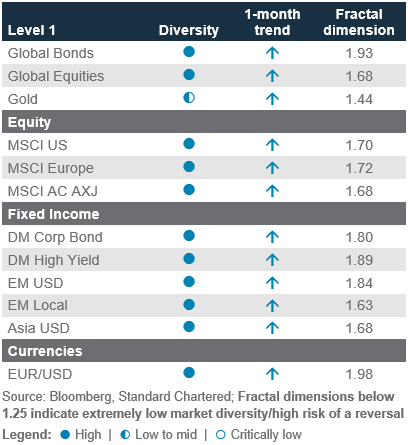
Explanatory notes
*1. Contingent Convertibles are complex financial instruments and are not a suitable or appropriate investment for all investors. This document is not an offer to sell or an invitation to buy any securities or any beneficial interests therein. Contingent convertible securities are not intended to be sold and should not be sold to retail clients in the European Economic Area (EEA) (each as defined in the Policy Statement on the Restrictions on the Retail Distribution of Regulatory Capital Instruments (Feedback to CP14/23 and Final Rules) (“Policy Statement”), read together with the Product Intervention (Contingent Convertible Instruments and Mutual Society Shares) Instrument 2015 (“Instrument”, and together with the Policy Statement, the “Permanent Marketing Restrictions”), which were published by the United Kingdom’s Financial Conduct Authority in June 2015), other than in circumstances that do not give rise to a contravention of the Permanent Marketing Restrictions.
Disclosure
This document is confidential and may also be privileged. If you are not the intended recipient, please destroy all copies and notify the sender immediately. This document is being distributed for general information only and is subject to the relevant disclaimers available at our Standard Chartered website under Regulatory disclosures. It is not and does not constitute research material, independent research, an offer, recommendation or solicitation to enter into any transaction or adopt any hedging, trading or investment strategy, in relation to any securities or other financial instruments. This document is for general evaluation only. It does not take into account the specific investment objectives, financial situation or particular needs of any particular person or class of persons and it has not been prepared for any particular person or class of persons. You should not rely on any contents of this document in making any investment decisions. Before making any investment, you should carefully read the relevant offering documents and seek independent legal, tax and regulatory advice. In particular, we recommend you to seek advice regarding the suitability of the investment product, taking into account your specific investment objectives, financial situation or particular needs, before you make a commitment to purchase the investment product. Opinions, projections and estimates are solely those of SC at the date of this document and subject to change without notice. Past performance is not indicative of future results and no representation or warranty is made regarding future performance. The value of investments, and the income from them, can go down as well as up, and you may not recover the amount of your original investment. You are not certain to make a profit and may lose money. Any forecast contained herein as to likely future movements in rates or prices or likely future events or occurrences constitutes an opinion only and is not indicative of actual future movements in rates or prices or actual future events or occurrences (as the case may be). This document must not be forwarded or otherwise made available to any other person without the express written consent of the Standard Chartered Group (as defined below). Standard Chartered Bank is incorporated in England with limited liability by Royal Charter 1853 Reference Number ZC18. The Principal Office of the Company is situated in England at 1 Basinghall Avenue, London, EC2V 5DD. Standard Chartered Bank is authorised by the Prudential Regulation Authority and regulated by the Financial Conduct Authority and Prudential Regulation Authority. Standard Chartered PLC, the ultimate parent company of Standard Chartered Bank, together with its subsidiaries and affiliates (including each branch or representative office), form the Standard Chartered Group. Standard Chartered Private Bank is the private banking division of Standard Chartered. Private banking activities may be carried out internationally by different legal entities and affiliates within the Standard Chartered Group (each an “SC Group Entity”) according to local regulatory requirements. Not all products and services are provided by all branches, subsidiaries and affiliates within the Standard Chartered Group. Some of the SC Group Entities only act as representatives of Standard Chartered Private Bank and may not be able to offer products and services or offer advice to clients.
Copyright © 2025, Accounting Research & Analytics, LLC d/b/a CFRA (and its affiliates, as applicable). Reproduction of content provided by CFRA in any form is prohibited except with the prior written permission of CFRA. CFRA content is not investment advice and a reference to or observation concerning a security or investment provided in the CFRA SERVICES is not a recommendation to buy, sell or hold such investment or security or make any other investment decisions. The CFRA content contains opinions of CFRA based upon publicly-available information that CFRA believes to be reliable and the opinions are subject to change without notice. This analysis has not been submitted to, nor received approval from, the United States Securities and Exchange Commission or any other regulatory body. While CFRA exercised due care in compiling this analysis, CFRA, ITS THIRD-PARTY SUPPLIERS, AND ALL RELATED ENTITIES SPECIFICALLY DISCLAIM ALL WARRANTIES, EXPRESS OR IMPLIED, INCLUDING, BUT NOT LIMITED TO, ANY WARRANTIES OF MERCHANTABILITY OR FITNESS FOR A PARTICULAR PURPOSE OR USE, to the full extent permitted by law, regarding the accuracy, completeness, or usefulness of this information and assumes no liability with respect to the consequences of relying on this information for investment or other purposes. No content provided by CFRA (including ratings, credit-related analyses and data, valuations, model, software or other application or output therefrom) or any part thereof may be modified, reverse engineered, reproduced or distributed in any form by any means, or stored in a database or retrieval system, without the prior written permission of CFRA, and such content shall not be used for any unlawful or unauthorized purposes. CFRA and any third-party providers, as well as their directors, officers, shareholders, employees or agents do not guarantee the accuracy, completeness, timeliness or availability of such content. In no event shall CFRA, its affiliates, or their third-party suppliers be liable for any direct, indirect, special, or consequential damages, costs, expenses, legal fees, or losses (including lost income or lost profit and opportunity costs) in connection with a subscriber’s, subscriber’s customer’s, or other’s use of CFRA’s content.
Market Abuse Regulation (MAR) Disclaimer
Banking activities may be carried out internationally by different branches, subsidiaries and affiliates within the Standard Chartered Group according to local regulatory requirements. Opinions may contain outright “buy”, “sell”, “hold” or other opinions. The time horizon of this opinion is dependent on prevailing market conditions and there is no planned frequency for updates to the opinion. This opinion is not independent of Standard Chartered Group’s trading strategies or positions. Standard Chartered Group and/or its affiliates or its respective officers, directors, employee benefit programmes or employees, including persons involved in the preparation or issuance of this document may at any time, to the extent permitted by applicable law and/or regulation, be long or short any securities or financial instruments referred to in this document or have material interest in any such securities or related investments. Therefore, it is possible, and you should assume, that Standard Chartered Group has a material interest in one or more of the financial instruments mentioned herein. Please refer to our Standard Chartered website under Regulatory disclosures for more detailed disclosures, including past opinions/ recommendations in the last 12 months and conflict of interests, as well as disclaimers. A covering strategist may have a financial interest in the debt or equity securities of this company/issuer. All covering strategist are licensed to provide investment recommendations under Monetary Authority of Singapore or Hong Kong Monetary Authority. This document must not be forwarded or otherwise made available to any other person without the express written consent of Standard Chartered Group.
Sustainable Investments
Any ESG data used or referred to has been provided by Morningstar, Sustainalytics, MSCI or Bloomberg. Refer to 1) Morningstar website under Sustainable Investing, 2) Sustainalytics website under ESG Risk Ratings, 3) MCSI website under ESG Business Involvement Screening Research and 4) Bloomberg green, social & sustainability bonds guide for more information. The ESG data is as at the date of publication based on data provided, is for informational purpose only and is not warranted to be complete, timely, accurate or suitable for a particular purpose, and it may be subject to change. Sustainable Investments (SI): This refers to funds that have been classified as ‘Sustainable Investments’ by Morningstar. SI funds have explicitly stated in their prospectus and regulatory filings that they either incorporate ESG factors into the investment process or have a thematic focus on the environment, gender diversity, low carbon, renewable energy, water or community development. For equity, it refers to shares/stocks issued by companies with Sustainalytics ESG Risk Rating of Low/Negligible. For bonds, it refers to debt instruments issued by issuers with Sustainalytics ESG Risk Rating of Low/Negligible, and/or those being certified green, social, sustainable bonds by Bloomberg. For structured products, it refers to products that are issued by any issuer who has a Sustainable Finance framework that aligns with Standard Chartered’s Green and Sustainable Product Framework, with underlying assets that are part of the Sustainable Investment universe or separately approved by Standard Chartered’s Sustainable Finance Governance Committee. Sustainalytics ESG risk ratings shown are factual and are not an indicator that the product is classified or marketed as “green”, “sustainable” or similar under any particular classification system or framework.
Country/Market Specific Disclosures
Botswana: This document is being distributed in Botswana by, and is attributable to, Standard Chartered Bank Botswana Limited which is a financial institution licensed under the Section 6 of the Banking Act CAP 46.04 and is listed in the Botswana Stock Exchange. Brunei Darussalam: This document is being distributed in Brunei Darussalam by, and is attributable to, Standard Chartered Bank (Brunei Branch) | Registration Number RFC/61 and Standard Chartered Securities (B) Sdn Bhd | Registration Number RC20001003. Standard Chartered Bank is incorporated in England with limited liability by Royal Charter 1853 Reference Number ZC18. Standard Chartered Securities (B) Sdn Bhd is a limited liability company registered with the Registry of Companies with Registration Number RC20001003 and licensed by Brunei Darussalam Central Bank as a Capital Markets Service License Holder with License Number BDCB/R/CMU/S3-CL and it is authorised to conduct Islamic investment business through an Islamic window. China Mainland: This document is being distributed in China by, and is attributable to, Standard Chartered Bank (China) Limited which is mainly regulated by National Financial Regulatory Administration (NFRA), State Administration of Foreign Exchange (SAFE), and People’s Bank of China (PBOC). Hong Kong: In Hong Kong, this document, except for any portion advising on or facilitating any decision on futures contracts trading, is distributed by Standard Chartered Bank (Hong Kong) Limited (“SCBHK”), a subsidiary of Standard Chartered PLC. SCBHK has its registered address at 32/F, Standard Chartered Bank Building, 4-4A Des Voeux Road Central, Hong Kong and is regulated by the Hong Kong Monetary Authority and registered with the Securities and Futures Commission (“SFC”) to carry on Type 1 (dealing in securities), Type 4 (advising on securities), Type 6 (advising on corporate finance) and Type 9 (asset management) regulated activity under the Securities and Futures Ordinance (Cap. 571) (“SFO”) (CE No. AJI614). The contents of this document have not been reviewed by any regulatory authority in Hong Kong and you are advised to exercise caution in relation to any offer set out herein. If you are in doubt about any of the contents of this document, you should obtain independent professional advice. Any product named herein may not be offered or sold in Hong Kong by means of any document at any time other than to “professional investors” as defined in the SFO and any rules made under that ordinance. In addition, this document may not be issued or possessed for the purposes of issue, whether in Hong Kong or elsewhere, and any interests may not be disposed of, to any person unless such person is outside Hong Kong or is a “professional investor” as defined in the SFO and any rules made under that ordinance, or as otherwise may be permitted by that ordinance. In Hong Kong, Standard Chartered Private Bank is the private banking division of SCBHK, a subsidiary of Standard Chartered PLC. Ghana: Standard Chartered Bank Ghana Limited accepts no liability and will not be liable for any loss or damage arising directly or indirectly (including special, incidental or consequential loss or damage) from your use of these documents. Past performance is not indicative of future results and no representation or warranty is made regarding future performance. You should seek advice from a financial adviser on the suitability of an investment for you, taking into account these factors before making a commitment to invest in an investment. To unsubscribe from receiving further updates, please send an email to feedback.ghana@sc.com. Please do not reply to this email. Call our Priority Banking on 0302610750 for any questions or service queries. You are advised not to send any confidential and/or important information to Standard Chartered via e-mail, as Standard Chartered makes no representations or warranties as to the security or accuracy of any information transmitted via e-mail. Standard Chartered shall not be responsible for any loss or damage suffered by you arising from your decision to use e-mail to communicate with the Bank. India: This document is being distributed in India by Standard Chartered in its capacity as a distributor of mutual funds and referrer of any other third party financial products. Standard Chartered does not offer any ‘Investment Advice’ as defined in the Securities and Exchange Board of India (Investment Advisers) Regulations, 2013 or otherwise. Services/products related securities business offered by Standard Charted are not intended for any person, who is a resident of any jurisdiction, the laws of which imposes prohibition on soliciting the securities business in that jurisdiction without going through the registration requirements and/or prohibit the use of any information contained in this document. Indonesia: This document is being distributed in Indonesia by Standard Chartered Bank, Indonesia branch, which is a financial institution licensed and supervised by Otoritas Jasa Keuangan (Financial Service Authority) and Bank Indonesia. Jersey: In Jersey, Standard Chartered Private Bank is the Registered Business Name of the Jersey Branch of Standard Chartered Bank. The Jersey Branch of Standard Chartered Bank is regulated by the Jersey Financial Services Commission. Copies of the latest audited accounts of Standard Chartered Bank are available from its principal place of business in Jersey: PO Box 80, 15 Castle Street, St Helier, Jersey JE4 8PT. Standard Chartered Bank is incorporated in England with limited liability by Royal Charter in 1853 Reference Number ZC 18. The Principal Office of the Company is situated in England at 1 Basinghall Avenue, London, EC2V 5DD. Standard Chartered Bank is authorised by the Prudential Regulation Authority and regulated by the Financial Conduct Authority and Prudential Regulation Authority. The Jersey Branch of Standard Chartered Bank is also an authorised financial services provider under license number 44946 issued by the Financial Sector Conduct Authority of the Republic of South Africa. Jersey is not part of the United Kingdom and all business transacted with Standard Chartered Bank, Jersey Branch and other SC Group Entity outside of the United Kingdom, are not subject to some or any of the investor protection and compensation schemes available under United Kingdom law. Kenya: This document is being distributed in Kenya by and is attributable to Standard Chartered Bank Kenya Limited. Investment Products and Services are distributed by Standard Chartered Investment Services Limited, a wholly owned subsidiary of Standard Chartered Bank Kenya Limited that is licensed by the Capital Markets Authority in Kenya, as a Fund Manager. Standard Chartered Bank Kenya Limited is regulated by the Central Bank of Kenya. Malaysia: This document is being distributed in Malaysia by Standard Chartered Bank Malaysia Berhad (“SCBMB”). Recipients in Malaysia should contact SCBMB in relation to any matters arising from, or in connection with, this document. This document has not been reviewed by the Securities Commission Malaysia. The product lodgement, registration, submission or approval by the Securities Commission of Malaysia does not amount to nor indicate recommendation or endorsement of the product, service or promotional activity. Investment products are not deposits and are not obligations of, not guaranteed by, and not protected by SCBMB or any of the affiliates or subsidiaries, or by Perbadanan Insurans Deposit Malaysia, any government or insurance agency. Investment products are subject to investment risks, including the possible loss of the principal amount invested. SCBMB expressly disclaim any liability and responsibility for any loss arising directly or indirectly (including special, incidental or consequential loss or damage) arising from the financial losses of the Investment Products due to market condition. Nigeria: This document is being distributed in Nigeria by Standard Chartered Bank Nigeria Limited (SCB Nigeria), a bank duly licensed and regulated by the Central Bank of Nigeria. SCB Nigeria accepts no liability for any loss or damage arising directly or indirectly (including special, incidental or consequential loss or damage) from your use of these documents. You should seek advice from a financial adviser on the suitability of an investment for you, taking into account these factors before making a commitment to invest in an investment. To unsubscribe from receiving further updates, please send an email to clientcare.ng@sc.com requesting to be removed from our mailing list. Please do not reply to this email. Call our Priority Banking on 02 012772514 for any questions or service queries. SCB Nigeria shall not be responsible for any loss or damage arising from your decision to send confidential and/or important information to Standard Chartered via e-mail. SCB Nigeria makes no representations or warranties as to the security or accuracy of any information transmitted via e-mail. Pakistan: This document is being distributed in Pakistan by, and attributable to Standard Chartered Bank (Pakistan) Limited having its registered office at PO Box 5556, I.I Chundrigar Road Karachi, which is a banking company registered with State Bank of Pakistan under Banking Companies Ordinance 1962 and is also having licensed issued by Securities & Exchange Commission of Pakistan for Security Advisors. Standard Chartered Bank (Pakistan) Limited acts as a distributor of mutual funds and referrer of other third-party financial products. Singapore: This document is being distributed in Singapore by, and is attributable to, Standard Chartered Bank (Singapore) Limited (Registration No. 201224747C/ GST Group Registration No. MR-8500053-0, “SCBSL”). Recipients in Singapore should contact SCBSL in relation to any matters arising from, or in connection with, this document. SCBSL is an indirect wholly owned subsidiary of Standard Chartered Bank and is licensed to conduct banking business in Singapore under the Singapore Banking Act, 1970. Standard Chartered Private Bank is the private banking division of SCBSL. IN RELATION TO ANY SECURITY OR SECURITIES-BASED DERIVATIVES CONTRACT REFERRED TO IN THIS DOCUMENT, THIS DOCUMENT, TOGETHER WITH THE ISSUER DOCUMENTATION, SHALL BE DEEMED AN INFORMATION MEMORANDUM (AS DEFINED IN SECTION 275 OF THE SECURITIES AND FUTURES ACT, 2001 (“SFA”)). THIS DOCUMENT IS INTENDED FOR DISTRIBUTION TO ACCREDITED INVESTORS, AS DEFINED IN SECTION 4A(1)(a) OF THE SFA, OR ON THE BASIS THAT THE SECURITY OR SECURITIES-BASED DERIVATIVES CONTRACT MAY ONLY BE ACQUIRED AT A CONSIDERATION OF NOT LESS THAN S$200,000 (OR ITS EQUIVALENT IN A FOREIGN CURRENCY) FOR EACH TRANSACTION. Further, in relation to any security or securities-based derivatives contract, neither this document nor the Issuer Documentation has been registered as a prospectus with the Monetary Authority of Singapore under the SFA. Accordingly, this document and any other document or material in connection with the offer or sale, or invitation for subscription or purchase, of the product may not be circulated or distributed, nor may the product be offered or sold, or be made the subject of an invitation for subscription or purchase, whether directly or indirectly, to persons other than a relevant person pursuant to section 275(1) of the SFA, or any person pursuant to section 275(1A) of the SFA, and in accordance with the conditions specified in section 275 of the SFA, or pursuant to, and in accordance with the conditions of, any other applicable provision of the SFA. In relation to any collective investment schemes referred to in this document, this document is for general information purposes only and is not an offering document or prospectus (as defined in the SFA). This document is not, nor is it intended to be (i) an offer or solicitation of an offer to buy or sell any capital markets product; or (ii) an advertisement of an offer or intended offer of any capital markets product. Deposit Insurance Scheme: Singapore dollar deposits of non-bank depositors are insured by the Singapore Deposit Insurance Corporation, for up to S$100,000 in aggregate per depositor per Scheme member by law. Foreign currency deposits, dual currency investments, structured deposits and other investment products are not insured. This advertisement has not been reviewed by the Monetary Authority of Singapore. Taiwan: SC Group Entity or Standard Chartered Bank (Taiwan) Limited (“SCB (Taiwan)”) may be involved in the financial instruments contained herein or other related financial instruments. The author of this document may have discussed the information contained herein with other employees or agents of SC or SCB (Taiwan). The author and the above-mentioned employees of SC or SCB (Taiwan) may have taken related actions in respect of the information involved (including communication with customers of SC or SCB (Taiwan) as to the information contained herein). The opinions contained in this document may change, or differ from the opinions of employees of SC or SCB (Taiwan). SC and SCB (Taiwan) will not provide any notice of any changes to or differences between the above-mentioned opinions. This document may cover companies with which SC or SCB (Taiwan) seeks to do business at times and issuers of financial instruments. Therefore, investors should understand that the information contained herein may serve as specific purposes as a result of conflict of interests of SC or SCB (Taiwan). SC, SCB (Taiwan), the employees (including those who have discussions with the author) or customers of SC or SCB (Taiwan) may have an interest in the products, related financial instruments or related derivative financial products contained herein; invest in those products at various prices and on different market conditions; have different or conflicting interests in those products. The potential impacts include market makers’ related activities, such as dealing, investment, acting as agents, or performing financial or consulting services in relation to any of the products referred to in this document. UAE: DIFC – Standard Chartered Bank is incorporated in England with limited liability by Royal Charter 1853 Reference Number ZC18.The Principal Office of the Company is situated in England at 1 Basinghall Avenue, London, EC2V 5DD. Standard Chartered Bank is authorised by the Prudential Regulation Authority and regulated by the Financial Conduct Authority and Prudential Regulation Authority. Standard Chartered Bank, Dubai International Financial Centre having its offices at Dubai International Financial Centre, Building 1, Gate Precinct, P.O. Box 999, Dubai, UAE is a branch of Standard Chartered Bank and is regulated by the Dubai Financial Services Authority (“DFSA”). This document is intended for use only by Professional Clients and is not directed at Retail Clients as defined by the DFSA Rulebook. In the DIFC we are authorised to provide financial services only to clients who qualify as Professional Clients and Market Counterparties and not to Retail Clients. As a Professional Client you will not be given the higher retail client protection and compensation rights and if you use your right to be classified as a Retail Client we will be unable to provide financial services and products to you as we do not hold the required license to undertake such activities. For Islamic transactions, we are acting under the supervision of our Shariah Supervisory Committee. Relevant information on our Shariah Supervisory Committee is currently available on the Standard Chartered Bank website in the Islamic banking section. For residents of the UAE – Standard Chartered Bank UAE does not provide financial analysis or consultation services in or into the UAE within the meaning of UAE Securities and Commodities Authority Decision No. 48/r of 2008 concerning financial consultation and financial analysis. Uganda: Our Investment products and services are distributed by Standard Chartered Bank Uganda Limited, which is licensed by the Capital Markets Authority as an investment adviser. United Kingdom: In the UK, Standard Chartered Bank is authorised by the Prudential Regulation Authority and regulated by the Financial Conduct Authority and Prudential Regulation Authority. This communication has been approved by Standard Chartered Bank for the purposes of Section 21 (2) (b) of the United Kingdom’s Financial Services and Markets Act 2000 (“FSMA”) as amended in 2010 and 2012 only. Standard Chartered Bank (trading as Standard Chartered Private Bank) is also an authorised financial services provider (license number 45747) in terms of the South African Financial Advisory and Intermediary Services Act, 2002. The Materials have not been prepared in accordance with UK legal requirements designed to promote the independence of investment research, and that it is not subject to any prohibition on dealing ahead of the dissemination of investment research. Vietnam: This document is being distributed in Vietnam by, and is attributable to, Standard Chartered Bank (Vietnam) Limited which is mainly regulated by State Bank of Vietnam (SBV). Recipients in Vietnam should contact Standard Chartered Bank (Vietnam) Limited for any queries regarding any content of this document. Zambia: This document is distributed by Standard Chartered Bank Zambia Plc, a company incorporated in Zambia and registered as a commercial bank and licensed by the Bank of Zambia under the Banking and Financial Services Act Chapter 387 of the Laws of Zambia.
